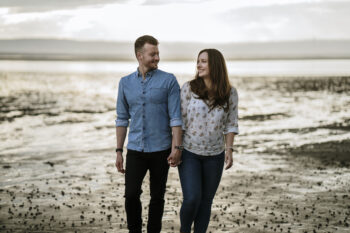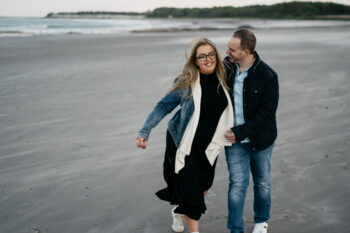
Update, 11 December: Venues are now able to reopen, with humanist marriages once again being treated the same as religious and civil marriages.
Original story:New two-week lockdown rules that came into force in Northern Ireland on Friday are causing serious, disproportionate disruption for couples having humanist marriages. This is because they require the vast majority of the venues in which they occur to shut, while allowing places of worship and register offices to continue to host religious and civil marriages, respectively. Northern Ireland Humanists estimates that around 90% of couples having humanist marriages are affected by the situation, and has urged the Government to fix the problem as soon as possible.
The new regulations, which are in force until 10 December, allow weddings to continue with up to 25 people in attendance. This includes outdoors, in places of worship (for religious marriages), in registry offices (for civil marriages), and elsewhere. But they also require premises used to provide food or drink to close – even, in officials’ view, if food and drink is not being provided, and including in parts of the premises where this is true even in normal times. This is underlined by guidance published alongside the regulations, which says that ‘marriage ceremonies cannot take place at any venue that is licensed to sell alcohol’, and ‘Can marriages and civil partnerships go ahead in hospitality venues? No, hospitality venues are closed.’
The result is that the vast majority of locations used by couples having humanist marriages are being forced to close – even though, when they are not providing food or drink, they should be just as safe as places of worship or registry offices.
Yesterday, Northern Ireland Humanists had extensive discussions with the Executive about the matter, and the relevant minister and officials committed to doing what they can to try to resolve the problem. But it is unclear whether this will be possible before 11 December.
Affected couples have expressed their frustration about the rules.
Hannah Lardner and Danny Conway were due to get married on 4 December, which due to the pandemic was already their fourth venue and second date, only to be told that their current venue must close as well. Their humanist celebrant is Jean Barrett Quinn. They commented:
‘We have always supported the lockdown measures, and have both not seen our families this year. We completely understand the importance of protecting those around us, the NHS, and the country. However, what we don’t understand is why, as members of Northern Ireland Humanists, our beliefs and our wedding is considered less critical than that of a religious couple. We have been made to feel that our wedding is less important, our views less valid, and our love, quite honestly, less sincere, than those who are still permitted to celebrate in their way with a celebrant who shares their beliefs, in a Church.’

Emma McCorry and Neil Mannus have also been affected by the new restrictions. Their humanist celebrant is Sarah Stewart. They commented:
‘We were due to get married in Ballymena last Sunday, a date and location that had already changed once due to the pandemic. There would have been no food and drink at our wedding, and so our venue would have been just as safe as a registry office or a place of worship. And yet we uniquely were told that our venue must close, significantly disrupting our plans at what is already a very trying time. We urge the Government to change its guidance as soon as possible, to make clear that others like us can have their big days go ahead as planned.’
Northern Ireland Humanists Coordinator Boyd Sleator commented:
‘These rules are unfair to humanist couples by closing the vast majority of possible venues they can use, while leaving other venues available just for couples having religious or civil marriages. So many couples are having their big day disrupted by these inconsistent and illogical closures.
‘We were pleased to be able to meet yesterday with the Northern Ireland Executive to discuss the matter, and were glad to find the minister and officials very sympathetic to our plight. But now we need the Executive to resolve the situation as soon as possible.’
Northern Ireland Humanists first became aware that there may be some form of problem with the new regulations when the two-week lockdown was first announced. Since then, it repeatedly raised concerns with ministers and officials. But this did not result in the problems being avoided, the precise nature of the issue only becoming apparent on Friday as the regulations were published – unhelpfully also the day they came into force. Yesterday, the Executive committed to looking into the issue as a matter of priority, and Northern Ireland Humanists were pleased with this commitment and with sympathy expressed by officials and the relevant minister. But the Government has not yet been able to commit to resolving the problem in any particular time frame.
Notes:
For further comment or information, please contact Northern Ireland Humanists Coordinator Boyd Sleator at Boyd.Sleator@humanists.uk or phone 02890 029946.
A humanist wedding is a non-religious ceremony conducted by a humanist celebrant who shares the beliefs and values of the couple. It differs from a civil wedding in that it is entirely personalised and reflective of the humanist beliefs and values of the couple. Humanists UK has provided these ceremonies for over 120 years.
Humanist marriages have been legally recognised in Northern Ireland since 2018.
Read more about our work on humanist marriages.
Northern Ireland Humanists is part of Humanists UK, working with the Humanist Association of Ireland. Humanists UK is the national charity working on behalf of non-religious people. Powered by 100,000 members and supporters, we advance free thinking and promote humanism to create a tolerant society where rational thinking and kindness prevail. We provide ceremonies, pastoral care, education, and support services benefitting over a million people every year and our campaigns advance humanist thinking on ethical issues, human rights, and equal treatment for all.
